Osceola National Forest Ocean Pond Campground
I keep coming back!
Nice camp ground. Clean. Host are the best. Tmobile has good service.
Campgrounds near Mayo, Florida are primarily concentrated along the Suwannee River, offering a mix of developed facilities and primitive sites in north-central Florida. Suwannee River Rendezvous Resort provides full-service camping with RV hookups, cabin rentals, and tent sites directly on the riverfront, while Lafayette Blue Springs State Park Campground offers additional camping options with spring access. The region encompasses several river camps that are part of the Suwannee River Wilderness Trail system, providing both developed and primitive camping experiences.
Most campgrounds in the area maintain year-round accessibility, though seasonal considerations affect water levels and site availability. "We did a 65 mile paddle on the Suwannee River and stayed at two river camps and a campsite! These river camps are a TREAT!" noted one visitor describing the river camp system. Facilities range from primitive sites with minimal amenities to full-service RV parks with electric, water, and sewer hookups. Spring and fall typically offer the most comfortable camping weather, while summer months bring higher humidity and occasional afternoon thunderstorms. Many riverside campgrounds may experience flooding during heavy rain periods, potentially limiting access to certain areas or amenities.
Riverside camping represents the primary draw for visitors to the Mayo area, with multiple spring-fed swimming areas enhancing the experience. The Suwannee River provides opportunities for paddling, fishing, and wildlife viewing directly from campgrounds. Several reviewers highlighted the unique activities available at certain campgrounds, including unusual entertainment options. A camper described Suwannee River Rendezvous as having "chicken poop bingo and pigeon races" along with more traditional activities like live music and karaoke. Most campgrounds welcome pets with specific guidelines. Cell service can be limited in more remote camping areas, particularly those along the river corridor away from town. Bathroom facilities vary widely between properties, from rustic vault toilets at primitive sites to climate-controlled restrooms with hot showers at developed campgrounds.
$30 - $70 / night
"The town of Mayo is a small quite town so it is advisable to have your provisions, as it is approximately 45 minutes to most shopping."
"My sites didn’t have great level spots for a tent but it was right next to the spring and close to the river for fishing which is why we came."
$25 - $220 / night
"With close proximity to several springs, we’ll definitely return."
"Fishing, canoeing, kayaking, swimming, boating, bike riding, walking, and some activities that they have at the place."
$100 / night
"There are trails to explore around springs and sinks. You can learn a lot about Florida's Aquifer and more staying at this and other camps."
"The sites are under the most beautiful live oaks and swimming in crystal clear spring water just steps away. Super pet friendly and clean bathhouse."
$22 - $100 / night
"This campground had some nice trails within easy walking distance of the campground."
"Great little state park just off I-10 in North Florida. Only 30 sites and all are FHU."
"The extensive submerged cave system is on eof the most beautiful attracting divers from around the world."
"Amidst Florida pines and oaks, you will find, the suwannee river. Follow a trail from your campground to the beautiful and dark waters of the Suwannee."
"The people are friendly, there's plenty to see, and it's just an all around great place. I can just image the festivals are even more killer. It's close to many of Floridas springs as well."
$45 - $60 / night
"We got there May1st, the place was relatively empty, but then came Cinco De Mayo weekend and it was amazing how many people came in. We sat back and watched."
"This is clearly one of the best natural springs in all of Florida complete with 250 wooded acres of pure Florida wilderness."
"Speaking of NYE they had a Motley Crew cover band, social distancing and masks are not a thing in this part of Florida, like the posters from the health department don't even mention masks, so if COVID"
"Bathrooms within walking distance. Pool and hot tub are great."
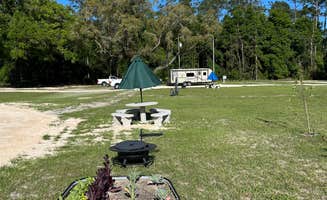
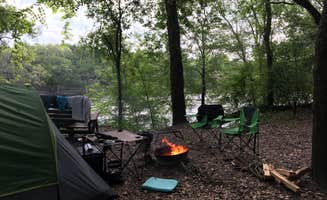
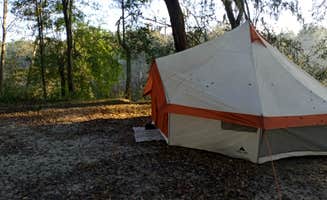
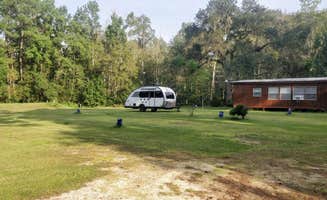

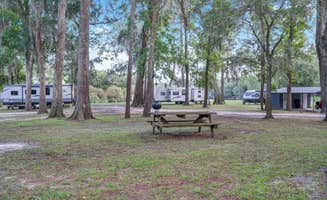
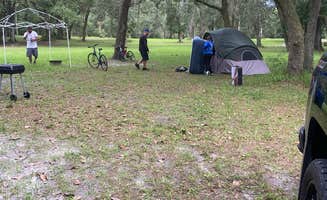
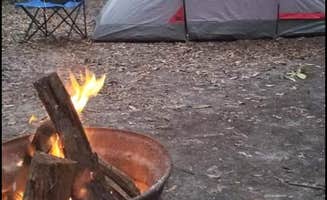
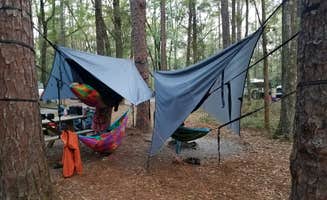
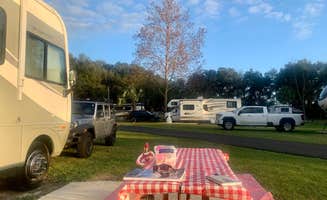
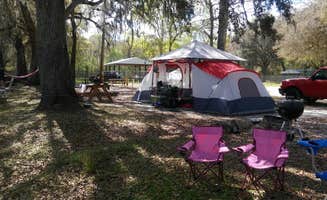
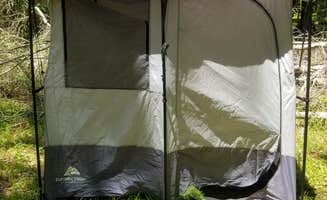
Nice camp ground. Clean. Host are the best. Tmobile has good service.
We had an absolutely amazing time at Heritage Oaks! There is something for everyone here. From the arcade to the poker room, spa, basketball courts, pool, hot tub, fire pit, dog park, and more, we enjoyed every amenity there was. Staff was great and attentive as well! Overall, when looking for a clean and modern RV resort, you can't beat Heritage Oaks. We can't wait to go back!
Lovely spot, easy level parking, picnic tables, water available, some spots with electric and some without, clean bathrooms
Nice park. Good views. All Host are really nice and helpful.
I have driven by this campground literally hundreds of times and never knew it was there. It is in a pretty setting in the forest on a sizable lake.
There are 3 separate sections that vary in hookups and costs, the first is primitive, the second has water hookup only, and lastly is the section with electric and water hookup.
No sites (except hosts sites) have sewer, but there is a nice dump station that is free to campers.
Check-in at the office is not available, you need to choose your site, scan the QR code on the post using the Recreation.Gov app and pay online.
BE AWARE:
If you check-in before 2:00pm the app will charge you for the prior day.
The app charges a ridiculous $10 service fee for each reservation. We wanted to stay additional days but since it would also mean a 2nd $10 service fee we declined.
BLM America the Beautiful pass holders receive a discount, but not the usual 50%.
At the time of our stay pricing was:
Electric + water sites: $30 a night ($22 for pass holders)
Water only sites: $20 ($12 for passholders)
Primitive sites: $12 ($8 for pass holders)
There are a very small number of sites (approx. 6) that are reservable.
Overall we enjoyed our stay, the staff on-site were super helpful and friendly, we would definitely return, but wanted to provide some transparency on some of the less desirable aspects of this location.
The Landing Group Area sits along Ocean Pond within Osceola National Forest, offering a group camp experience with a brilliant lakefront view and direct water access, where for the unbelievable price of $100 / night, you can easily pack at least a dozen (if not 20) tents along with room to roll-up 3-4 RVs with water & electric hook-ups. Like seriously, this feels like a camping tailgate party destination if ever there was one! First impressions: tall pines and cypress draped in Spanish moss line the sandy loops. You’ll see a modest private beach head, excellent sized pavilion with half a dozen picnic tables, picnic shelters and a wide-open access to the water with enough room for a half dozen fold-up chairs, 2-3 kayaks and a dozen fishing poles.
The amenities are generous for a group area. You’ll find electric and water hookups for a few RVs (up to ~40 ft), potable water, bathhouse facilities with hot showers and flush toilets, picnic tables, fire pits, a proper large group-sized grill and a pavilion large enough for gatherings like a men’s group or a small reunion. The site accommodates up to 50 overnight guests and 75 day-users. The lodge is meant for group outings, family reunions, church retreats, or company events. The best part? You will have this place all to yourself (well, your entire group) with no other nearby sites or fellow campers to deal with.
One of the strong draws is Ocean Pond itself (which, let's be clear, is neither a pond nor the ocean). It offers boating, canoeing, kayaking and fishing where you can cast your lines for bluegill, crappie, catfish and more from the shore or via boat launch. The private beach is a relaxing spot to wade or chill in the shallows. The surrounding forest hosts wildlife sightings where you can expect to see wading birds like herons and egrets, turtles, maybe an otter or two, and plenty of swamp and marsh edge life.
Insider Tips? Here’s a few: (1) Reserve well ahead as this group site books quickly for weekends and special events; (2) Use the pavilion early for meals or shade as your group dinners will go smoother there versus in the wide-open where, because it’s Florida, you could encounter tropical rains at anytime; (3) Bring lots of extension cords as there’s only a few outlets in the pavilion and your hookup site, which likely is one of the 4 RV slots, may be some distance from the pavilion or where you set up your tent; (4) Launch your canoe or kayak from the sandy beach area for calm paddling early in the morning as the current picks up with small, but still formidable waves to contend with later in the day; (5) Plan meals to use the large grill and fire pits as they’re built to serve crowds and the largesse of these cooking amenities should be used to full effect and are perfect sized, considering the large group you have gathered around you; (6) Pack bug spray as mosquitoes love dusk near the pond edges; and (7) Consider arriving by daylight so you can assign your group to the best spots before dark.
Happy Camping!
After exploring the museum, enjoying the nature trails, enjoy some fishing, or bird watching along the river. See where the river sinks( ends) and look for the turtles in the water. The campsites are shaded, level and qell kept. Bathrooms are clean, handicapped accessable, and conviently located. Pets welcome, families welcome. Big rigs may find the campground roads tight, but there are multiple sites available for big rigs. Be aware there are trees along the roads, so be aware of any lower branches.
I really enjoyed my time at the campground—it truly felt like there was something for everyone. I spent time playing basketball and pickleball, and it was great having so many ways to stay active. There was also a playground and a volleyball court, which added to the fun. When it was time to relax, I loved hanging out in the outdoor lounge, grabbing food from the food trucks, or stopping by the clubhouse for coffee. The pool and spa were perfect for unwinding, and the arcade was a fun way to pass the time—the kids absolutely loved it. Everything was incredibly clean, especially the showers and bathrooms, which made a big difference. Having an on-site laundry room was very convenient, and the spacious sites made the campground feel comfortable rather than crowded. The firepits were perfect in the evenings, and the pet area was a great touch for our fur baby. One of my favorite features was the gated entry with secure access codes, which made the campground feel safe and secure—especially with kids playing throughout the grounds. Overall, it felt more like a resort than a campground, and I would definitely stay here again.
Drove thru the forest literally hundreds of times on I-10 and never knew the campground was there. Nice smaller campground.
Our site was #10.
All but about 5-6 sites are first come first serve. You find a vacant site then you must load the Recreation.Gov app to reserve it.
The campgorund is separated into 3 sections, one the sites have electric and water, these can be difficult to get during busy weekends and holidays. The second has sites with only water hookups (some fully shaded). Finally there are "privative" sites that have no hookups. These are in a heavily wooded area and would be risky to attempt to get in there with anything other than a tent or camper under 20 feet.
Here is a list of my personal Pro's and Con's:
Pros:
Good sized sites
Pretty location (Lake front with ramp).
Off the beaten path
Spotless restrooms& showers
Pleasant Staff
Easy access Dump Station w/water
Cons:
$10 reservation service fee.
BLM pass holder discount less than the normal 50%
Most sites are First-Come-First-Serve and must be reserved upon arrival using the Recreation.Gov APP, not the website.
Checking in before 2:00 p.m. local time will result in them charging you for the previous day.
Be aware if you need sun exposure for your solar charging many are heavily shaded.
On busy nights/weekends sites with Electric are in high demand and may not be available. You can try taking one of the water only sites for a single night then see it you can get into one with electric ones the next morning after someone checks out.
We originally stayed 4 nights and wanted to extend it by 1-2 nights but since that meant another $10 service fee, we declined.
Site fees:
Electric & Water $30 ($22 w/pass)
Water only $20 ($12 w/pass)
Primitive $12 ($8 w/pass)
Camping options near Mayo, Florida primarily center along the Suwannee River and nearby springs, with sandy riverside spots that accommodate various camping styles. The area's subtropical climate keeps temperatures mild year-round, though summer humidity can be intense from June through September. Most campsites offer direct water access, with several providing specialized river camp platforms designed specifically for paddlers traveling the Suwannee River Wilderness Trail system.
Kayak between river camps: The Suwannee River Wilderness Trail features interconnected river camps spaced a day's paddle apart. "We did a 65 mile paddle on the Suwanee River and stayed at two river camps and a campsite! We loved all the spots," notes one camper about their experience at Peacock Slough River Camp, adding "there's a spring just before the river camp that looked like a great swimming spot."
Cave diving for experienced divers: Peacock Slough's underwater cave system attracts skilled divers from across the globe. "The extensive submerged cave system is one of the most beautiful, attracting divers from around the world," explains a reviewer. The springs maintain a consistent 72-degree temperature year-round, making this a specialized destination for certified cave divers.
Attend unique weekend events: Local campgrounds host distinctive entertainment options throughout the week. At Suwannee River Rendezvous Resort, one visitor notes, "What a great family friendly campground. We try and go 4-5 times a year and each time NEVER disappoints. In addition to having chicken poop bingo and pigeon races (yes, those are real things!) They also have regular bingo, karaoke and live music."
Spring swimming access: Lafayette Blue Springs features clear 72-degree water year-round with unique geological features. A camper at Lafayette Blue Springs State Park Campground shares, "Beautiful spring for swimming featuring a limestone bridge way you can snorkel under. If you're into diving they also have an underwater cave, just make sure to check in with the ranger station 2 miles north before diving."
Covered camping platforms: Screened sleeping structures at river camps provide relief from insects and weather. "River camp has bath house with water and electric, grills, fire pits, tent camping area and screened sleeping platforms with electric, lighting and ceiling fans. Many units also have hooks to hang hammocks," describes a visitor at Adams Tract, noting the practicality of these structures during Florida's buggy summer months.
Dispersed tent sites: Primitive camping options allow for more secluded experiences. A camper at Suwannee River Rendezvous Resort explains, "The lower section has dispersed tent camping right on the river underneath beautiful big oak trees. Couldn't even imagine a better campsite!" This campsite near Mayo, Florida offers both developed and primitive options depending on your preference.
Spring water levels fluctuate: River conditions directly impact spring clarity and access. "If your main purpose for visiting is to swim in the spring make sure to call ahead or go online and check water conditions as this spring is attached to the Suwanee river and can sometimes be 'browned out' due to river levels," advises a reviewer at Lafayette Blue Springs State Park.
Limited cell service: Remote camping areas have minimal connectivity. "Wifi is bad, like real bad but you are in the woods," reports a visitor at Ellie Ray's RV Resort & Lounge, recommending campers "bring everything you need or eat bar food" due to limited shopping options.
Bathroom facilities vary widely: Campground restroom quality ranges from rustic to well-maintained. "Clean individual bathrooms. Pool area is nice. High water has the spring covered up so can't comment on that," notes one reviewer about facilities at Suwannee River Rendezvous Resort, while others mention that non-air-conditioned bathhouses can be uncomfortable during summer months.
Bring wheelbarrows for river access: River camps provide transport tools for gear. A Peacock Slough River Camp visitor highlights the "wheelbarrows to wheel your stuff from the river to campsite. Amazing!" This practical feature makes river-based camping with children much more manageable.
Consider heat exposure: Limited shade at some campgrounds requires heat management strategies. An Ellie Ray's camper notes, "Not many trees for shade and the sites are a little close but not bad." During summer months, plan activities for early morning or evening to avoid peak temperatures.
Check entertainment schedules: Family-friendly activities often follow weekly patterns at larger campgrounds. "Friday night bingo and Saturday has pigeon races, chicken poo bingo and trivia/karaoke," details a visitor at Suwannee River State Park Campground, adding that their camping area was "quiet, relaxing, and shaded. The park, and bathroom was well maintained and very clean."
Book upper sites for more space: Campground elevation affects site size and comfort. "Upper is spacious, bath house has no air conditioning which is BAD in summer. Folks are real friendly and staff is great," advises an RVer at Suwannee River Rendezvous Resort. The upper sites typically offer more level ground and better circulation.
Prepare for limited shopping options: Nearby towns have minimal services. A camper at Grace Gardens Campground reports the area is "peaceful and quiet. 9 sites. 8 FHU & 1 W/S," noting "no traffic sounds, just a vehicle down the road once or twice an hour." This isolation means stocking up before arrival is essential.
Plan for night train noise: Railroad tracks near some campgrounds create periodic disruptions. A family staying at Suwannee River State Park mentions, "There is a train that comes roughly 2 times a night after midnight. Kids all slept through it so no problem there." Noise-sensitive campers should select sites furthest from tracks or bring earplugs.
Frequently Asked Questions
What camping is available near Mayo, FL?
According to TheDyrt.com, Mayo, FL offers a wide range of camping options, with 154 campgrounds and RV parks near Mayo, FL and 3 free dispersed camping spots.
Which is the most popular campground near Mayo, FL?
According to TheDyrt.com, the most popular campground near Mayo, FL is Suwannee River Rendezvous Resort with a 4.6-star rating from 20 reviews.
Where can I find free dispersed camping near Mayo, FL?
According to TheDyrt.com, there are 3 free dispersed camping spots near Mayo, FL.
Keep Exploring